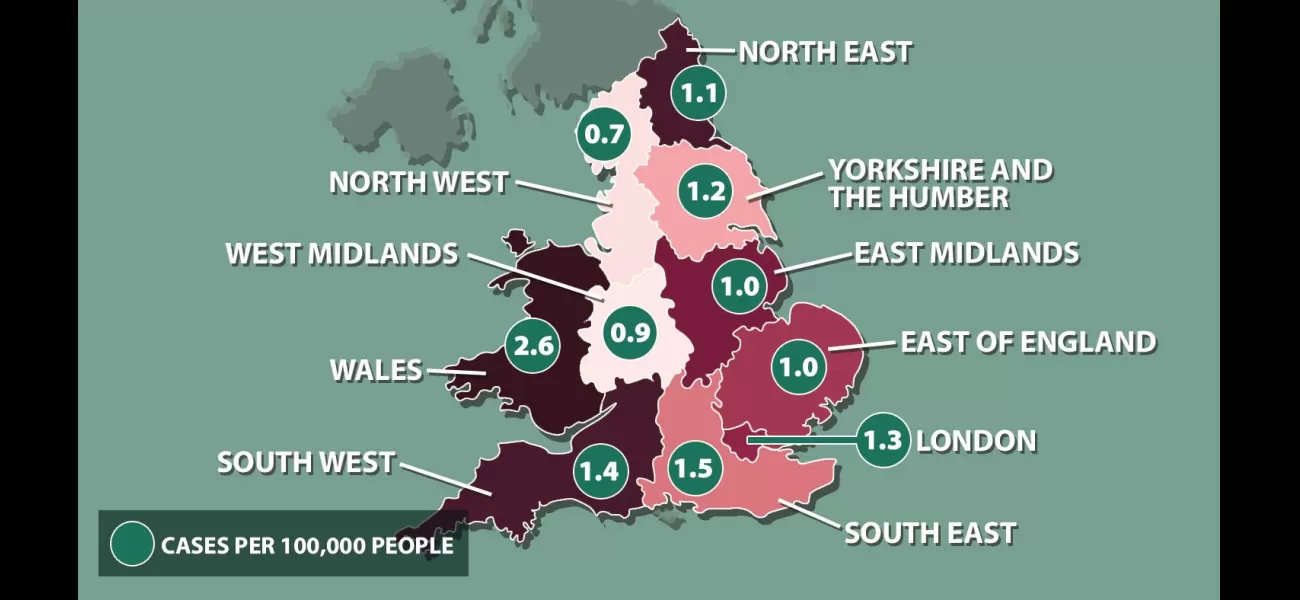Graph displays regions most affected by severe cases of pertussis
In some regions, there are significantly higher rates of infection, according to recent data from authorities.
May 10th 2024.

Experts are urging pregnant women to protect themselves and their babies by getting vaccinated against whooping cough. There has been a rise in potentially deadly cases among infants, with five babies dying from the disease in just the first three months of this year.
The number of confirmed cases during this period was triple the amount from last year. And the numbers continue to increase, with a more than doubling from 555 in January to 1,319 in March. Some areas are experiencing even more severe outbreaks, according to recent data from the UK Health Security Agency.
In fact, the infection rate in the worst-affected part of the country is nearly four times higher than the least-affected area. Wales reported the highest rate of cases, followed by south-west and south-east England. While most parts of the country have similar rates, the North West and West Midlands have consistently reported lower numbers.
The figures in Wales are more than double the average for England and Wales, while the North West's rate is almost half the average. Unfortunately, comparable data for Scotland and Northern Ireland were not available.
And the trend is not slowing down. In the first three weeks of April alone, there were 2,201 reported cases, compared to 1,319 in the entire month of March. While not all reported cases are later confirmed in labs, the two figures are not significantly different, according to the UKHSA.
The sharp increase in cases has been linked to a drop in the number of pregnant women getting vaccinated. A new vaccine was introduced in 2012 that protects newborns by vaccinating the mother during pregnancy. However, less than 60% of pregnant women accepted this vaccine between October and December 2023, a significant decrease from around 76% during the same period in 2017.
This drop in vaccination rates is the main reason behind the surge in cases, according to Professor Sir Andrew Pollard, a consultant paediatrician and chairman of the Joint Committee on Vaccination and Immunisation. He emphasized the importance of higher vaccination rates, especially for the most vulnerable group - infants who are too young to be vaccinated themselves.
He explained that for the past decade, there haven't been many cases of whooping cough because of the high vaccination rates. But as soon as those rates start to fall, we see an increase in cases, similar to the recent measles outbreak. He stressed that if we do not take action to increase vaccination rates and control the spread of the disease, more babies will be severely affected, and sadly, more deaths will occur.
The number of confirmed cases during this period was triple the amount from last year. And the numbers continue to increase, with a more than doubling from 555 in January to 1,319 in March. Some areas are experiencing even more severe outbreaks, according to recent data from the UK Health Security Agency.
In fact, the infection rate in the worst-affected part of the country is nearly four times higher than the least-affected area. Wales reported the highest rate of cases, followed by south-west and south-east England. While most parts of the country have similar rates, the North West and West Midlands have consistently reported lower numbers.
The figures in Wales are more than double the average for England and Wales, while the North West's rate is almost half the average. Unfortunately, comparable data for Scotland and Northern Ireland were not available.
And the trend is not slowing down. In the first three weeks of April alone, there were 2,201 reported cases, compared to 1,319 in the entire month of March. While not all reported cases are later confirmed in labs, the two figures are not significantly different, according to the UKHSA.
The sharp increase in cases has been linked to a drop in the number of pregnant women getting vaccinated. A new vaccine was introduced in 2012 that protects newborns by vaccinating the mother during pregnancy. However, less than 60% of pregnant women accepted this vaccine between October and December 2023, a significant decrease from around 76% during the same period in 2017.
This drop in vaccination rates is the main reason behind the surge in cases, according to Professor Sir Andrew Pollard, a consultant paediatrician and chairman of the Joint Committee on Vaccination and Immunisation. He emphasized the importance of higher vaccination rates, especially for the most vulnerable group - infants who are too young to be vaccinated themselves.
He explained that for the past decade, there haven't been many cases of whooping cough because of the high vaccination rates. But as soon as those rates start to fall, we see an increase in cases, similar to the recent measles outbreak. He stressed that if we do not take action to increase vaccination rates and control the spread of the disease, more babies will be severely affected, and sadly, more deaths will occur.
[This article has been trending online recently and has been generated with AI. Your feed is customized.]
[Generative AI is experimental.]
0
0
Submit Comment





